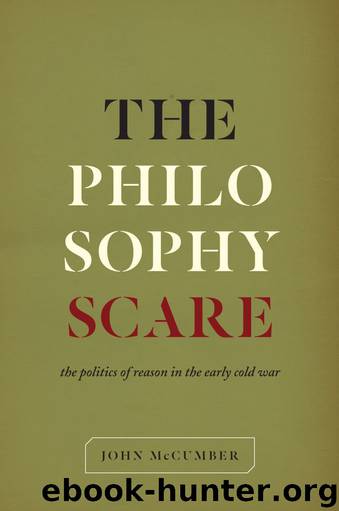The Philosophy Scare: The Politics of Reason in the Early Cold War by McCumber John

Author:McCumber, John
Language: eng
Format: epub
Tags: Philosophy, History, Political Science
ISBN: 9780226396415
Publisher: University of Chicago Press
Published: 2016-09-14T16:00:00+00:00
Rational Choice Ethics
The correspondences between RCT and scientific philosophy extend beyond these epistemological and ontological doctrines to hold for ethics as well. In RCT, as we saw, preferences are assumed as given; what Reichenbach calls “volitions” are, correspondingly, assumed. Preferences in RCT are given, and in accord with its doctrine of citizen’s sovereignty, they cannot be criticized. RCT thus has no ethical implications (unless we count that fact itself as an ethical implication). To be sure, ethical imperatives can be derived from RCT. If, for example, we take consumer sovereignty as a moral norm, we can say that everyone ought to make decisions independently of others’ preference rankings and thus arrive at a vindication of individual autonomy somewhat like that of Kant or Socrates. This, as we saw in chapter 3, is how Arrow first introduces consumer sovereignty—as a desirable counterweight to imposition and dictatorship. But he then builds it into RCT, for which it serves as a presupposition: the theory applies specifically where dictatorship and imposition are not present. When RCT is elevated into a general theory of the human mind itself, this specificity is lost: we are each responsible for our own preferences. Thus, in scientific philosophy, as in RCT, individual preferences cannot be criticized, while the general principle that each person is responsible for her own preferences is not a norm but a fact. The result is that there are no ethical implications to reason itself: morality is not a matter of knowledge. Hence, Reichenbach’s treatment of ethics in RSP does not present an ethical theory but instead argues that one is impossible. The two key concepts in this are those of the “volition” and the “imperative.”
Reichenbach’s discussion of volitions (at RSP, 282) parallels the view of preferences in RCT. A volitional decision, like a rational choice, is for a course of action leading to a desired outcome (Reichenbach refers to volitions as “desires” at RSP, 314). Just as preferences are assumed by rational choice theory as given (salient thesis [4] from chapter 3), so volitions are simply found in us; they appear as “products of our own” (RSP, 282). As with preferences, it is irrelevant where volitions come from (though Reichenbach hazards some conjectures); and, as with preferences in RCT (salient thesis [10]), it is impossible rationally to validate or criticize volitions (RSP, 280, 288, 315, 277). Substantive moral issues are therefore beyond the reach of philosophy: “There is no point in asking the philosopher to justify valuations. And he cannot supply a scale of valuational order distinguishing between higher and lower values. Such a scale is in itself valuational, not cognitive.”23
It is tempting to contrast volitions with preferences in that, while preferences are rankings, volitions are not necessarily ranked. But this is not exactly the case. Ranking of volitions, Reichenbach goes on to say here, is possible and indeed “relevant,” but it is not the province of the philosopher. Reichenbach does, however, classify volitions by their goals: some are more “primary” than others. The primary
Download
This site does not store any files on its server. We only index and link to content provided by other sites. Please contact the content providers to delete copyright contents if any and email us, we'll remove relevant links or contents immediately.
The Secret History by Donna Tartt(19053)
The Social Justice Warrior Handbook by Lisa De Pasquale(12187)
Thirteen Reasons Why by Jay Asher(8894)
This Is How You Lose Her by Junot Diaz(6877)
Weapons of Math Destruction by Cathy O'Neil(6266)
Zero to One by Peter Thiel(5787)
Beartown by Fredrik Backman(5737)
The Myth of the Strong Leader by Archie Brown(5500)
The Fire Next Time by James Baldwin(5431)
How Democracies Die by Steven Levitsky & Daniel Ziblatt(5216)
Promise Me, Dad by Joe Biden(5141)
Stone's Rules by Roger Stone(5081)
A Higher Loyalty: Truth, Lies, and Leadership by James Comey(4954)
100 Deadly Skills by Clint Emerson(4921)
Rise and Kill First by Ronen Bergman(4780)
Secrecy World by Jake Bernstein(4741)
The David Icke Guide to the Global Conspiracy (and how to end it) by David Icke(4709)
The Farm by Tom Rob Smith(4502)
The Doomsday Machine by Daniel Ellsberg(4484)
